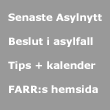ASYLNYTT
Sponsrad av Fridh Advokatbyrå
ARKIV:
EU:s flykting- och gränspolitik
Allmänt om migration, statistik

Asylnytt - Arkiv
Debatt och partipolitik
Strategier och metoder i flyktingrörelsen
Klipp från media
Länk till information från myndigheter och organisationer
- Arkiveringsdatum 220125:
- How Denmark's hard line on Syrian refugees is an aid group's ethical dilemma
Arkiveringsdatum 220125:
The New Humanitarian 22-01-11:
How Denmark's hard line on Syrian refugees is an aid group's ethical dilemma
Denmark is the first European country to tell large numbers of Syrian refugees to go home. While it hasn't begun deportations, nearly 400 Syrians from in and around the capital, Damascus, have been stripped of their residency permits and the right to work since 2019.
(...)
Many governments and international organisations produce COI reports - like the one used to support Denmark's decision - to gather information on refugees' home countries to help guide immigration authorities in their asylum decisions. They often consult civil society, but Denmark is unusual in paying DRC - an NGO whose mandate is to protect refugees and their rights - to join fact-finding missions and co-write reports, according to experts.
Established in the 1950s as an umbrella organisation for Danish refugee groups, DRC has a long history of working closely with the Danish government - which is also one of its largest funders. This particular report on Syria created a fierce debate within the organisation about the benefits of its close relationship with the government, which openly states that its goal is to have as few refugees in the country as possible.
The New Humanitarian interviewed nine current and former DRC officials about the report, some of whom spoke on condition of anonymity. On one side of the internal debate are staff who believe DRC can positively impact policy from the inside by maintaining its close relationship with the government. On the other are those who believe DRC's participation was used to legitimise Europe's harshest policy on Syrians and did little - if anything - to help protect refugees.
(...)
Hela artikeln (Extern länk)
Källor: Informationen på denna sida är hämtad från följande källor (externa länkar): EU (kommissionen, ministerrådet, parlamentet och domstolen), Europarådet (mr-kommissionären, domstolen, kommittén mot tortyr), FN:s flyktingkommissariat UNHCR, FN:s kommitté mot tortyr m.fl. FN-organ, Sveriges Radio, SvT, andra svenska media via Nyhetsfilter och pressmeddelanden via Newsdesk, utländska media till exempel via Are You Syrious och Rights in Exile, internationella organisationer som Amnesty International, Human Rights Watch, ECRE, Statewatch och Picum, organisationer i Sverige som Rädda Barnen, Asylrättscentrum, Svenska Amnesty, FARR och #vistårinteut samt myndigheter och politiska organ som Migrationsverket, Sveriges domstolar, JO, Justitiedepartementet m.fl. departement och Sveriges Riksdag.
Bevakning: Hjalte Lagercrantz och Sanna Vestin. Sammanställning: Sanna Vestin. Asylnytt är ett ideellt projekt. Sponsring avser prenumerationsavgifter. Tips emottages tacksamt.

 innehåll
innehåll